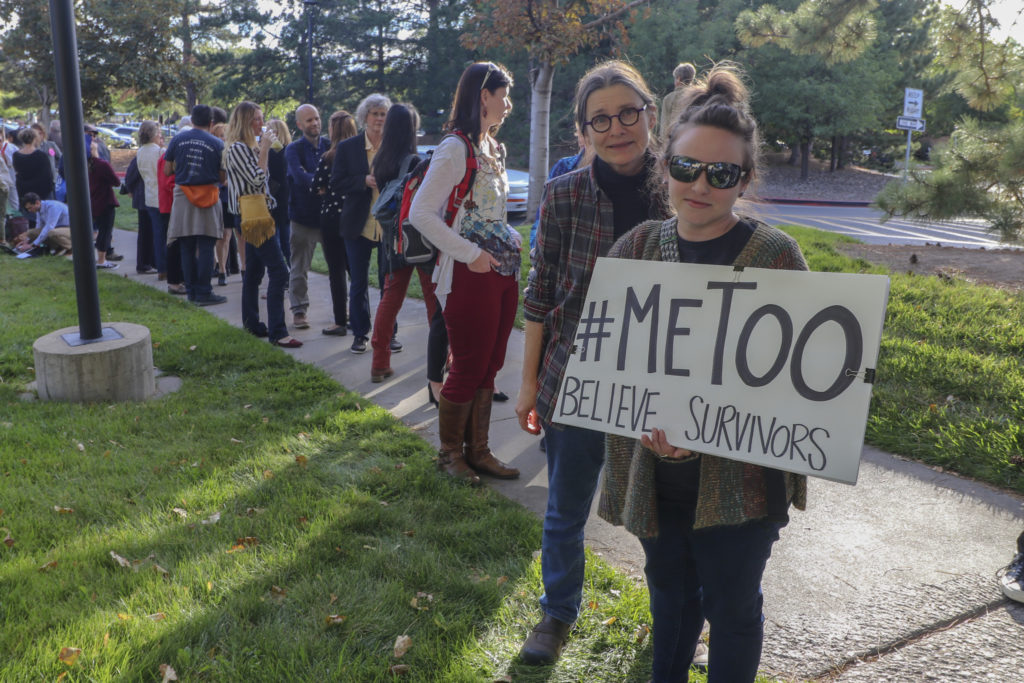
For Anita Hill, the integrity of the Supreme Court was what mattered when she accused Judge Clarence Thomas of sexual harassment after he was nominated to the Supreme Court by President George H.W. Bush in 1991, making Hill a national figure.
“This was at stake in 1991,” Hill said. “And it is what is at stake today.”
Now a professor of social policy, law and women’s gender and sexuality studies at Brandeis University, Hill spoke before more than 600 people at the University of Utah on Sept. 26.
Hill spoke the night before Christine Blasey Ford, who accused Supreme Court nominee Brett Kavanaugh of sexual misconduct, testified before the Senate Judiciary Committee. Hill recounted her own experience with that same committee to contextualize her view of the Kavanaugh hearing.
Hill said the Kavanaugh hearing may prove similar to the hearings held for Thomas in 1991. She said the Senate has already decided what to rule and that its decision to “rush to a vote” reflected a prioritization of political values over human values.
She also emphasized the need for systemic change to prevent further sexual harassment. “The problem is well-documented.”
The U.S. Equal Employment Opportunity Commission reported that in 2015, it received approximately 28,000 charges alleging harassment in the workplace. The harassment was sexual in nature in 45 percent of those allegations.
Still, Hill said only about a quarter of those who experience harassment report it. Even fewer report sexual assault. As a result, Hill said there are hundreds of thousands of cases that go unaddressed.
“We have a very limited understanding of the problem and what it means,” she said. “We have not yet, as a society, come to terms with the fact that we need to confront this behavior.”
Hill said victims are seldom believed.
Hill said that during the 1991 Senate Judiciary Committee hearing senators “relied on misogynistic tropes to support their positions.” She was called an erotomaniac. Orrin Hatch, R-Utah, asked her if she plagiarized “The Exorcist” in her testimony. Another senator called her story “crap.”
Hill offered her testimony as evidence against Thomas’s character and his unsuitability for a lifetime appointment. Still, Thomas was confirmed 52–48.
“Days after the gavel fell,” Hill said, “seemingly nothing had changed. But something had changed for many people. They would never view the court the same way; they would never view politics the same way; they would never see women’s experiences the same way.”
She described the time as a “#MeToo moment” without social media, though ultimately the chance for positive change was missed. Though she said public consciousness was being developed and people were speaking up.
“The government was behind,” Hill said. “We did not have clear government leadership pushing the issue.” Hill said policies called “pro-business” negatively impacted women. “We just didn’t want to deal with the harshness of the problem, of the complexity of the problem. We couldn’t face those hard realities.”
Hill outlined a “bundle of things we can do” to deal with sexual harassment as a systemic issue. “We are at a moment now where we can learn.”
Sexual harassment often starts out as gender harassment, Hill said, which occurs when women face “questioning of their ability just because they are women.” Since gender harassment is a precursor to sexual harassment, this behavior must be stopped before it rises to the level of greater abuse.
Hill also called for the instatement of a universal system which would allow anyone to “come in to a space and know that they have a complaint option that is viable and safe.”
She said low-income and contract workers are especially susceptible to harassment because they may not be subject to legal protections and often have trouble affording legal counsel.
“We must see this as a cultural problem, and not as a behavior problem,” Hill said. “We must look at the structures and systems that are involved and not just individual organizations.” This way, Hill said, society can continue to make progress on this issue. “The answers require deep thinking and even deeper commitment.”
She invited those in attendance to make that commitment.

“What will you do?” she asked. “What will you do, knowing that we are at this moment? Will you engage your own institutions in change? Will you engage politically? Will you talk to your students, your children, your parents? Will you give it all up and move to Canada? I will tell you that I will continue to use my voice.”
Ashley Weitz, who attended the event holding a sign that read “#MeToo Believe Survivors,” explained what she was doing as part of her commitment.
Weitz participates in a daily protest. Sept. 26 was her protest’s 82nd consecutive day. Weitz’s protest is part of a nationwide movement called #StandOnEveryCorner. The movement consists of daily peace rallies held in 231 cities across America.
Though the #StandOnEveryCorner movement was originally founded to protest family separation at the border, Weitz also protests sexual injustice and a culture of silence she said she perceives around sexual harassment and assault.
Weitz said one in four girls and one in seven boys will be sexually abused by age 18. According to the Department of Justice, this second figure is actually one in six.
Weitz explained she chose to attend the event because “these are conversations that need to be happening.”

She and her protest partner, Liz Rank, encouraged event attendees to get registered to vote. According to Weitz, in Utah “we have less of a voter suppression problem than we have a voter depression problem.”
Weitz encouraged voters not to stay at home, even if election outcomes seem like foregone conclusions. She said she believes if more young people vote, Utah could become a “swing state.”

After seating filled and a limited number of attendees were allowed to stand in the back of the room, doors were closed and others were turned away. Some people watched from the room’s windows, pressing their ears against the glass.
Bob Goldberg, the director of the University of Utah’s Tanner Humanities Center, which hosted the event, said there was no push back against the event on campus.
“There’s been a great energy in support,” he said. “I can’t begin to tell you the number of requests we’ve had for seats.”
Goldberg said he attempted to secure a larger venue but was ultimately unable to.
Hill’s event was part of an international lecture series called the Tanner Lectures on Human Values, which are held annually on each participating campus. According to Goldberg, participating institutions include Oxford University, Harvard University and Yale University, among others.
Goldberg said Hill’s lecture was arranged earlier this year, before Brett Kavanaugh was nominated to the Supreme Court, and was originally intended to focus on the #MeToo movement. Goldberg called Hill a woman of accomplishment who would address gender equality, workplace discrimination and sexual abuse. These issues are as relevant today as they were in 1991, he said.
“History may not repeat itself, but it certainly echoes,” Goldberg said.




